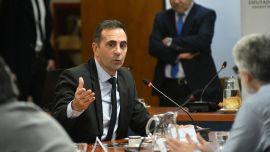With the PASO primaries now apparently a distant memory, a self-inflicted political crisis has taken over the Fernández-Fernández administration. Apparently confirming theories that suggested it was Cristina Fernández de Kirchner who was really in charge all along, this internal tension in the ruling Frente de Todos has placed the vice-president at the centre of the stage once again. How powerful is she, really? At the same time, the notion of the emergence of an “albertismo” has taken hold, suggesting the president could be building his own power structure to repeal the Kirchnerite attack. Alberto was at his weakest since taking office last Sunday after suffering the equivalent of a technical knockout at the hands of the main opposition coalition, Juntos, but also the eternally unpopular Left and even the liberals of Javier Milei and José Luis Espert, all of which had relatively successful elections. How strong is he, really?
Another curious fact regarding this whole mess is the fact that it occurred after holding primaries, giving the Fernández-Fernández administration the opportunity to gain back some of the lost ground with the advantage of counting on the state’s resources. It wasn’t going to be easy, having been handily defeated by a coalition formed by former president Mauricio Macri (with the memory of his disastrous administration still fresh) amd currently being led by City Mayor Horacio Rodríguez Larreta. In the Peronist bastion that is Buenos Aires Province — dubbed “the mother of all battles” — Juntos took a cumulative 38 percent of the vote tallying up both primary candidates (Deputy Mayor Diego Santilli and neurosurgeon Facundo Manes), compared with 33.6 percent for Victoria Tolosa Paz. Nationally, the opposition took 40 percent, compared with Frente de Todos’ 31 percent. If they had been legislative elections, these results would mean the pan-Peronist front would lose quorum in the Senate, a devastating blow to Mrs. Fernández de Kirchner who presides over that chamber of Congress. In the lower house, they would lose key allies and enough seats to effectively fail to retain their majority status.
Do they hold any real chance of overturning the “unprecedented electoral defeat,” as Cristina put it? It seems more unlikely now, after airing dirty laundry publicly and acknowledging a split between Alberto and the Peronist hawks closer to Kirchnerism. “In the Buenos Aires Province, an inexcusable [sic] social and economic thermometer of our country, last Sunday we were abandoned by 440,172 voters that Unidad Ciudadana had obtained in 2017 with our candidacy for the Senate…with a divided Peronism, no national or provincial government to support us and the Mauricio Macri administration and its judicial team persecuting and incarcerating former officials and opposing media owners left and right,” wrote the vice-president in her fateful letter. It isn’t clear whether Cristina believes they can mount a comeback, but she definitely has a lot at stake: while she called for ministers and officials responding to her to tender their resignation, a few hardcore Kirchnerites have stealthily remained in their posts, including National Treasury Attorney Carlos Zannini and Juan Martín Mena, deputy (and virtual) Justice Minister.
Blame Alberto. In the heat of the moment, the main culprit behind the electoral tragedy for the Frente de Todos was none other than President Alberto Fernández. Yet, as noted in a column written that night, Alberto is the perfect man to be responsible for such a mess. He’s led a mediocre government that was forced to face the one-two punch of an endemic and painful economic crisis and a global pandemic. During his best moment, when collaboration with Rodríguez Larreta and Province Mayor Axel Kicillof led to sky-high approval ratings, Alberto doubled down on petty political skirmishes that were the hallmark of the pernicious Macri-Cristina divide that he campaigned against in 2019. As he began to metamorphose into a Kirchnerite caricature, he personally committed a series of unnecessary unforced errors, the apex of which was attending a birthday party in Olivos for his partner, Fabiola Yáñez, in the heat of the lockdown.
And yet, Alberto is an easy target. The perfect punching bag. The structural issues facing the Argentine political system are substantially more profound than the superficial and lightweight Alberto Fernández. As in 2015, when a majority of the population was sick and tired of 12 years of Kirchnerism and an exhausted economic model that bred stagflation, Macri won the mandate to oust Cristina and her crew. That same energy was palpable in 2019 after the implosion of Mauricio’s government. And it has surfaced once again, castigating the Frente de Todos at the ballot box but also feeding the growth of anti-party candidates like Milei (who did extremely well in the City of Buenos Aires) and the Left, traditionally a huge underachiever. At least since the 2001 break, but exacerbated by the last three presidential mandates, a generation of Argentines has become poorer, less educated and increasingly dehumanised. The Kirchnerite epic of the first years of Néstor no longer works.
Thus, it is difficult to just blame Alberto, and Mrs. Fernández de Kirchner’s hardball approach seems to be making the situation worse. To the point where she was forced to call Economy Minister Martín Guzmán and tell him she wasn’t looking for his resignation, despite months of feeding that rumour. Guzmán is all this government has between it and an aggressive market reaction akin to what marked the death knell for Macri. Cristina emerges as the obvious guilty party, having pulled her ministers from the Cabinet and publicly denounced the president and his administration as incompetents who’ve only executed half of the annual budget with only three months left in the year. Yet it would be excessive to pin the blame solely on Cristina too. The issue at hand is structural, it relates to a generalised systems failure with the Argentine state front and centre. Alberto, Macri and José de San Martín would’ve crashed this ship, which has reached a level of dysfunction that is only becoming a more efficient poverty machine.
Hopefully this process leads towards moderation and rationality from all political actors, because all of their necks are out on the line. As are our lives.






















Comments